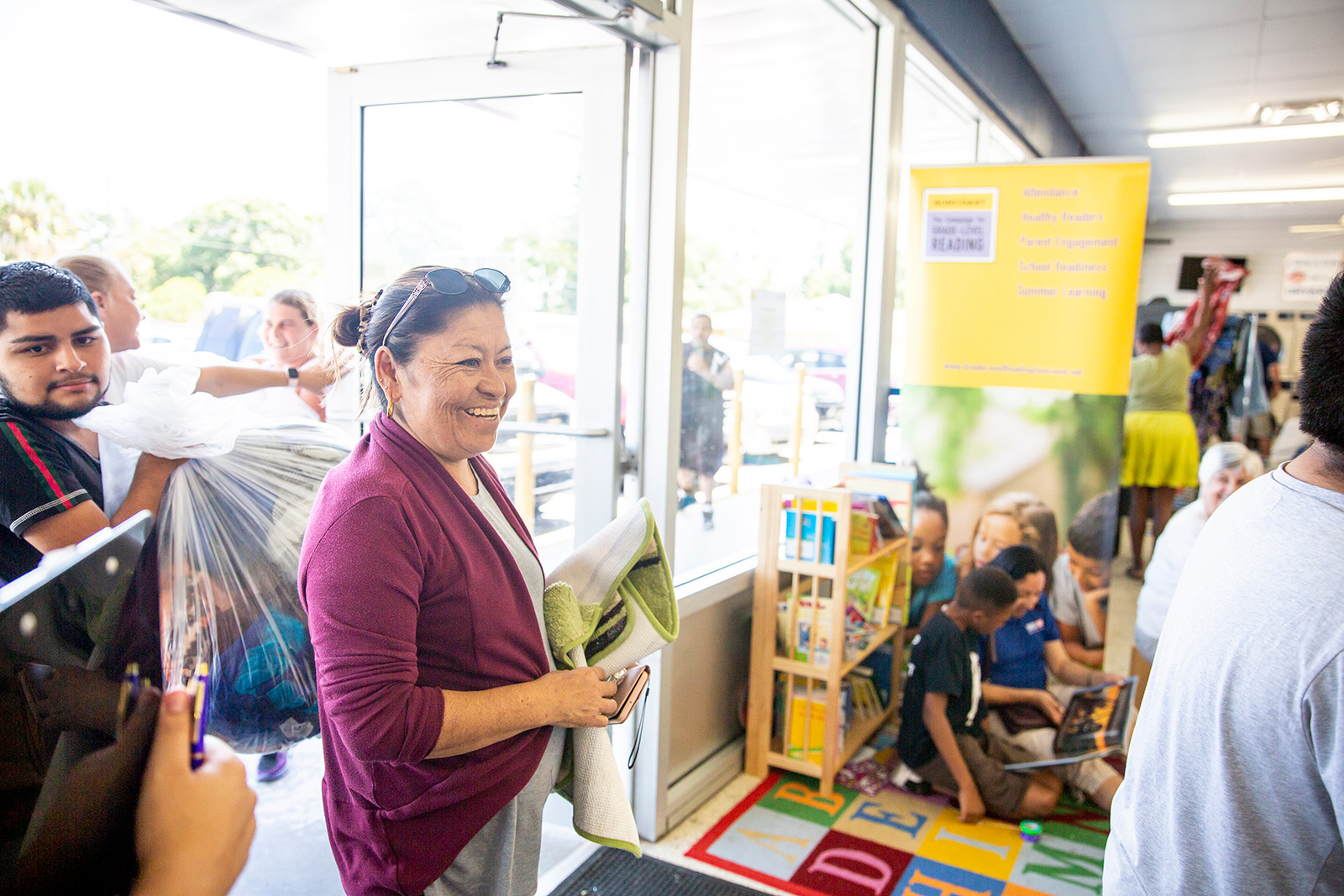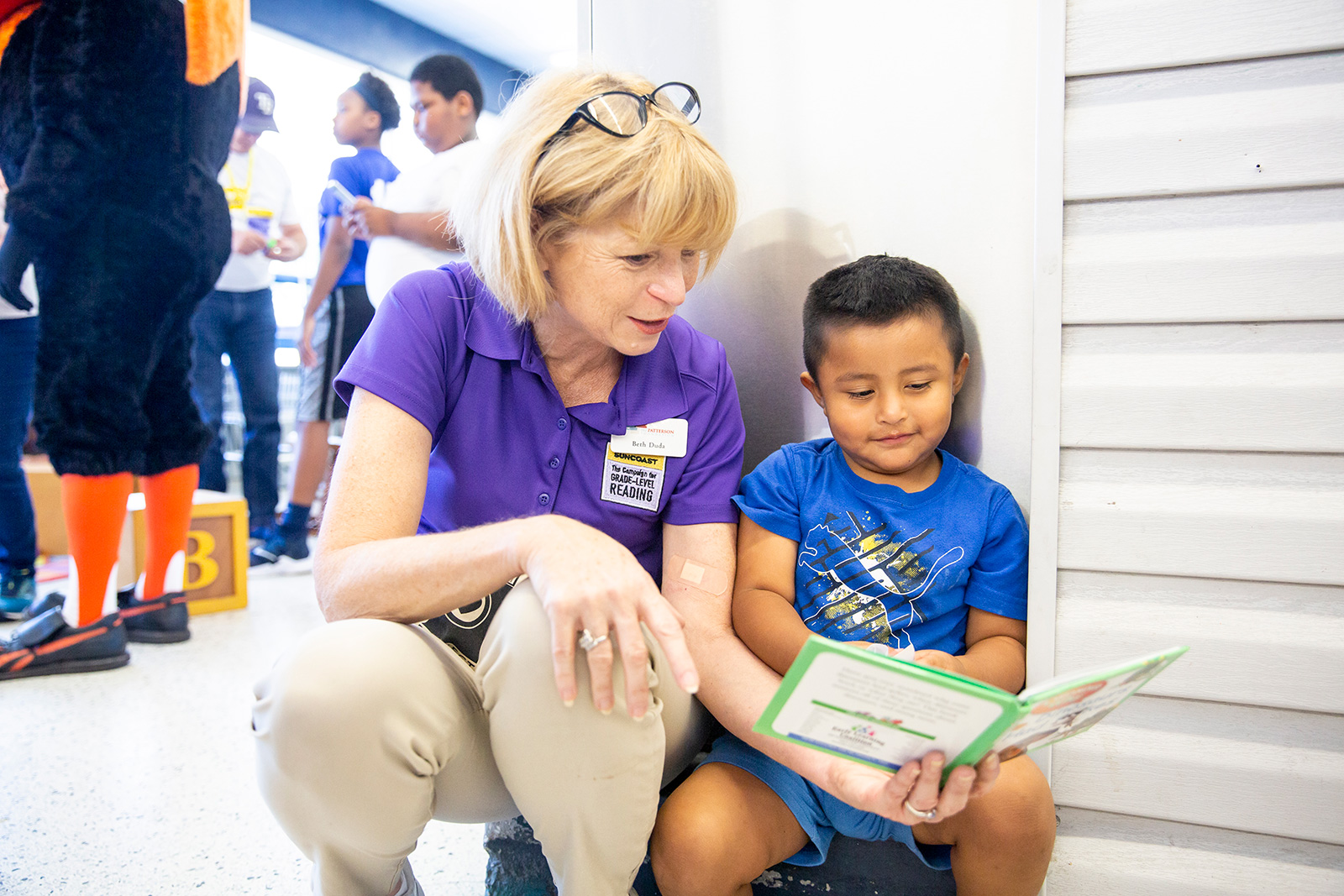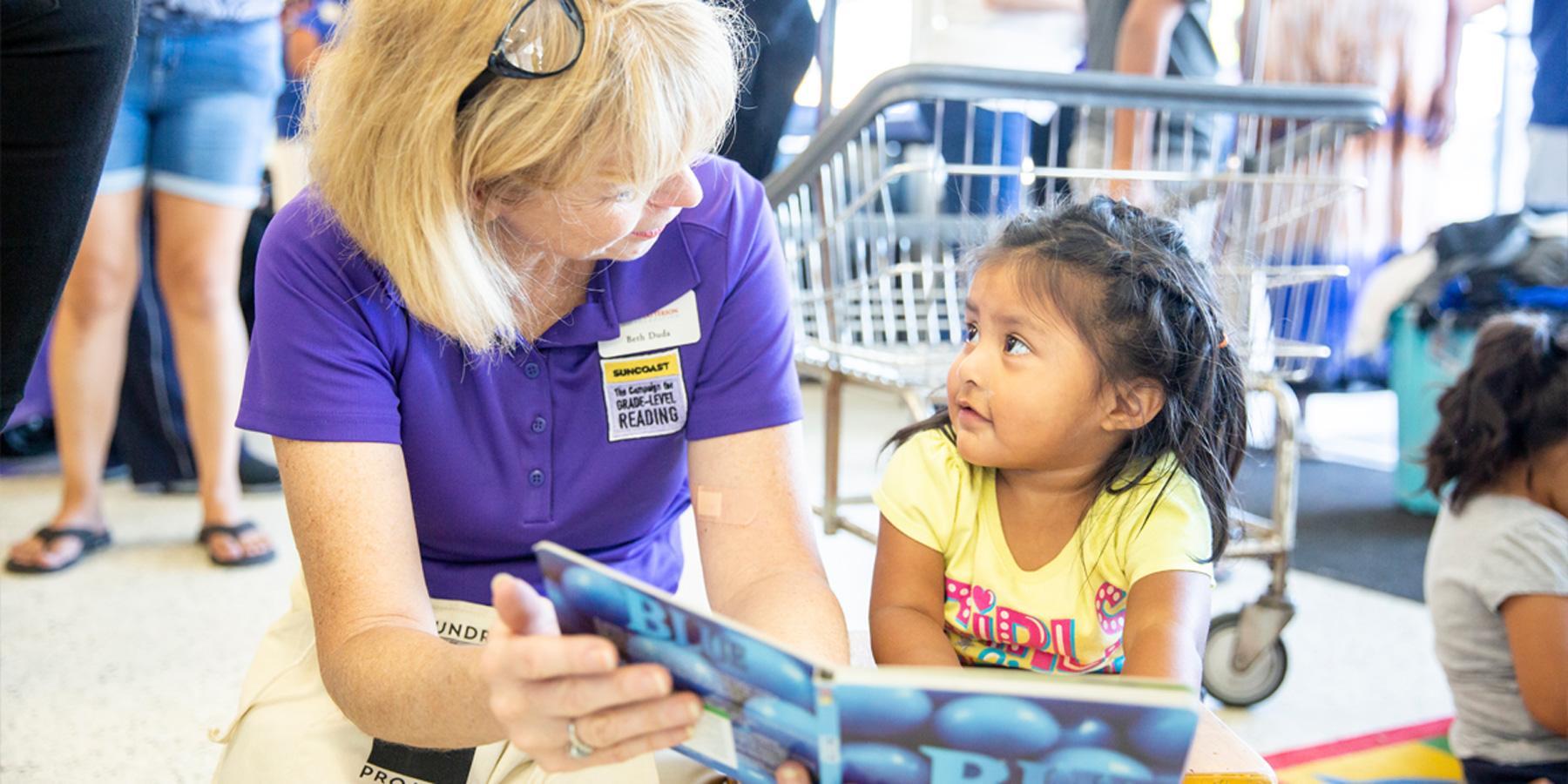Why Don’t We Just Do That?
Over Cocktails, Restaurateurs Hatch a Plan for Literacy
Even without advance promotion, when word got out that the SuperMatt Laundromat in Sarasota, Florida, was offering free laundry all day, neighborhood residents formed a steady stream of customers.
Not only was laundry-and-all-the-fixings free—a boon to low-income families who can ill afford the $35 to $50 a week they spend trying to keep their kids in clean clothes—the food bank was there with abundant food to restock their pantries.
Best of all, there were books—lots of books—and plenty of volunteers to read to children while the adults did as many loads of laundry as needed. When the children left, books went home with them.
To the Suncoast Campaign for Grade-Level Reading (SCGLR), a nationally recognized leader in advancing child literacy, books are only part of their latest “Pop-Up Neighbor” event. Equally important, says Beth Duda, the campaign’s director, is the community-wide cooperation that created, supported and implemented the event.

For example, The Patterson Foundation provides regional support for SCGLR, working with lead partners: the Community Foundation of Sarasota County, United Way Suncoast and United Way of Charlotte County. This collaboration among Sarasota, Manatee, Charlotte and DeSoto counties on Florida’s southwestern coast galvanizes businesses, individuals, governments, nonprofits and the media to tackle the shocking statistic that about 64 percent of children nationwide are not reading to grade level by third grade. The number jumps to nearly 80 percent for children in low-income families and more for low-income children of color. Children’s inability to read at grade level has significant, long-term consequences for the children, their communities and the nation itself.
As testament to the collaboration and commitment, more than 4,000 volunteers have taken ownership of this issue through SCGLR in their Florida communities.
“It’s not a school issue,” Duda says. “It is a community issue. If we’re going to make a difference, it is incumbent on us to look at our shared aspiration for the children in our community. I have not met a single person whose wish is that only 20 percent of our children succeed in life.”
The Goal: Disrupting Intergenerational Poverty
The Suncoast Campaign for Grade-Level Reading is one of more than 360 communities in 44 states, the District of Columbia, Puerto Rico, the U.S. Virgin Islands, Saskatchewan and Alberta that collectively make up the Campaign for Grade-Level Reading. This effort is fueled by more than 4,100 local organizations, including libraries, museums, public housing agencies, universities and YMCAs aimed at disrupting intergenerational poverty to ensure that children in low-income families succeed in school, and graduate high school, prepared for careers and active citizenship. More than 400 family foundations, community foundations, United Ways, corporate-giving programs and individual donors are supporting network communities like those in the Suncoast region in outreach and engagement unique to their people and places.
“One of the major gateways out of intergenerational poverty is the child’s ability to read proficiently by the end of third grade,” says Ralph Smith, managing director and founder of the Campaign for Grade-Level Reading. Up until third grade, children are taught reading. Beyond third grade, reading opens the way to everything else that is taught. Without the foundation of solid reading skills, a child gets exponentially left in the dust as classmates move on to study and master subject matter and the non-reader becomes increasingly isolated — a “slow-moving catastrophe,” as Smith describes it.

The dimensions of that catastrophe are clear: Two thirds of U.S. fourth graders are not proficient readers, according to national reading assessment data, and more than four out of every five low-income students miss this critical milestone. How to turn it around? Smith realized that the necessary strategy is mobilization, which the dictionaries tell us means to “assemble, marshal and make ready for war or some other emergency.”
“People widely agree that children knowing how to read is important,” Smith says. “The Campaign for Grade-level Reading is a mobilization effort to have communities build on that consensus and do something, to take action and find solutions. Schools can’t succeed alone. We want to engage communities so that they understand what’s behind so many kids starting out unprepared and falling so far behind, then work together to remove those barriers.”
In his experience as chief of staff and special counsel with the Philadelphia public school system and 20-year tenure as senior vice president of the Annie E. Casey Foundation, Smith came to see firsthand the challenges schools face in trying to succeed with educating low-income children. Schools alone cannot provide all the elements needed to disrupt the cycle of poverty.
Where the Difference Can Be Made
A key factor in children’s lack of reading proficiency is that many kids come to school unprepared for learning. Research shows that by kindergarten, low-income children are exposed to millions fewer words than their peers from higher-income families. Children without early learning experience start kindergarten already 12 to 14 months behind their peers.
Sometimes low-income children lag behind in learning simply because they aren’t in school. Asthma and chronic health problems, dental pain, transportation problems, homelessness and food insecurity, financial difficulties and other factors can have children absent so many days they miss what school has to offer. Summer vacation often offers, not an opportunity for children to catch up with peers but rather, without reinforcement and support, lost ground. Then, back-to-school can mean more discouragement and awareness of being left behind.
To break poverty’s grip, all of these factors must be addressed so that children come to school healthy and prepared to learn. The Campaign for Grade-Level Reading’s excellent “The Statisticks Lottery” video graphically outlines how this exponential “slide” occurs.
4 “Radical Inclusion” Offerings Mobilize Consensus to Action
As one of the Campaign’s “Pacesetter” communities, SCGLR exemplifies how communities can mobilize to address deficits through what Duda calls the “radical inclusion” that, yes, mobilizes the important sectors of their communities that can make a difference.
- The SCGLR Book Circle Initiative for parents and educators includes a meal and childcare to address two of the barriers to parent participation. In spring 2019, more than 900 people attended this Book Circle Initiative, reading together The Power of Presence, by Joy Thomas Moore, who came to town to kick off the Book Circle and met with some of those who had read her book to discuss their shared experience as single parents.
- Vroom: SCGLR interacts with parents as often and in as many informal spaces as possible. It has shared Vroom with parents. Vroom is a free science-based program with downloadable resources, including a mobile app and SMS-text platform, that turns the latest research on early learning brain development into playful, actionable tips and activities parents can enjoy with their children ages 0-5. Activities turn routine shared moments—mealtimes, bathing, taking a bus—into brain-building moments. Each tip also provides the “Brainy Background” of how each activity helps develop the child’s brain.
- Mind in the Making: Ellen Galinsky, chief science officer at the Bezos Family Foundation and author of Mind in the Making: The Seven Essential Life Skills Every Child Needs, developed a series of eight training modules that SCGLR makes available to any group in the region. In September, Suncoast will see the 1,000th graduate from its Mind in the Making (MITM) workshops. The modules engage families and professionals in an experiential process of self-reflection and self-discovery to explore their own competence in each of the seven skills, probe why each skill is important and become proactive in proposing strategies to improve their own skills. MITM connects the adults’ experiences to the research on each skill through videos about the most respected and compelling child development research on each skill.
- Free Books: Community groups donate the truckloads of books needed to saturate communities with books for local children. And the Patterson Foundation supports the Suncoast Summer Reading Challenge, which provides resources for any organization that connects with children during the summer. SCGRL provides financial support for organizations or businesses that want such a program, along with brightly colored silicone bracelets for the children. Kids receive a bracelet for each book they read. Duda says. “Some of our incoming first and second graders are reading 50, 60 books — and collecting 60 bracelets!”
Measurable Progress
The bracelets are not the only prize. Duda explains, “In partnership with our school districts, we’re able to compare the last diagnostic test the children take in spring, then compare that with the first test they take coming back in the fall, to get a clear picture of summer learning loss or gain. Last year, more than 60 percent of our kids who took the reading challenge not only didn’t suffer any loss over the summer, but 40 percent actually had a learning gain.”
This year, working with YMCAs, the Boys & Girls Clubs and a variety of community businesses and organization, Suncoast boasts 92 summer providers serving more than 8,000 children.
“None of this is a one-off,” Duda emphasizes. “We are building social capital — weaving a tapestry of support for our children, and each of us has a thread we can lend to the tapestry. Whether you can volunteer for an hour or you’re a business owner who can offer so much more, starting from that shared aspiration that we want all of our children to have the tools they need to succeed, and engaging radical inclusion, we are making an observable difference in these children’s reading capacity.
“It’s not only exciting, it’s joyous.”
Featured photo caption: The Suncoast Campaign for Grade-Level Reading and The Laundry Project teamed up to hold a #PopUpNeighbor event at SuperMatt Laundromat/Lavandería in North Sarasota. Pop Up Neighbor events are unexpected opportunities where caring volunteers make real connections with individuals and families while alleviating the cost of laundry. For three hours, everyone who walked into the laundromat had their laundry fees paid, thanks to the generosity of The Patterson Foundation. Photography by Karan Arango
RESOURCES
Reading
Why Don’t We Just Do That?
Over Cocktails, Restaurateurs Hatch a Plan for Literacy
Meeting (and Teaching) Families in Unexpected Places Can Transform Cities
Grocery Stores, bus stops, laundromats…what’s next?
Museums Are for Kids: Busting Myths at the Milwaukee Art Museum
Video
Vroom: Brain-Building Basics
Ellen Galinsky: Move Aside Helicopter and Snowplow Parents, Here Comes Autonomy Support (An Early Learning Nation Studio production recorded at the 2019 Society for Research in Child Development Biennial Meeting.)
JD Chesloff: Helping Business Leaders Back Early Learning Initiatives (An Early Learning Nation Studio production recorded at the 2018 Ready Nation Global Business Summit on Early Childhood.)

K.C. Compton
K.C. Compton worked as a reporter, editor and columnist for newspapers throughout the Rocky Mountain region for 20 years before moving to the Kansas City area as an editor for Mother Earth News. She has been in Seattle since 2016, enjoying life as a freelance and contract writer and editor.



